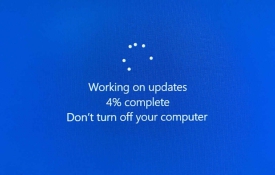-
0 Guarding Your Digital Gates: The Latest Malware Threats of February 2025
- Computer Repair
- by Chad Sanders
- 02-19-2025
0.00 of 0 votesStay Ahead of Cybercriminals with Insights from CS Computer Repair In an era where cyber threats evolve at lightning speed, February 2025 brings a new wave of sophisticated malware attacks targeting individuals and businesses alike. From AI-driven phishing schemes to ransomware variants that can cripple entire infrastructures, staying informed is your first line of defense. Chad Sanders of CS Computer Repair delves into the most pressing malware threats of the month and offers actionable steps to safeguard your digital assets. As we navigate through February 2025, the digital landscape is fraught with unseen perils lurking behind innocent clicks and downloads. Cybercriminals are more cunning than ever, employing advanced techniques to infiltrate systems and compromise data. At CS Computer Repair, we're committed to keeping you informed and protected. Here's what you need to watch for this month: 1. AI-Powered Phishing Attacks Gone are the days of easily identifiable spam emails riddled with typos. Today, cybercriminals harness generative AI to craft highly personalized and convincing phishing messages. These AI-driven attacks can mimic trusted contacts or brands, making malicious emails and messages indistinguishable from legitimate ones. The goal? To trick you into clicking on malicious links or disclosing sensitive information. Stay Vigilant: Always verify the sender's identity before clicking on links or downloading attachments. Look for inconsistencies in email addresses and URLs, and when in doubt, contact the source directly. 2. Ransomware Evolution: LockBit, Lynx, and Virlock Ransomware continues to be a formidable threat, with new variants emerging that are more resilient and damaging. Notably, LockBit, Lynx, and Virlock have dominated the ransomware scene in 2025. These strains not only encrypt your data but also employ double extortion tactics—stealing your information and threatening to leak it unless a ransom is paid. Virlock adds another layer of menace by being self-replicating, allowing it to spread across networks rapidly. Protect Yourself: Regularly back up your data to offline storage. Ensure your operating systems and software are up-to-date with the latest security patches. Implement robust antivirus solutions and consider network segmentation to prevent the spread of infections. 3. Mobile Malware on the Rise Our smartphones are treasure troves of personal information, making them prime targets for cybercriminals. Recent reports indicate a surge in mobile malware, with threats projected to comprise 30% of overall malware volume by 2025. These malicious applications can steal sensitive data, track your location, or even hijack your device. Stay Safe: Download apps only from official app stores. Be cautious of apps requesting excessive permissions. Keep your mobile operating system updated, and consider installing reputable mobile security software. 4. Exploitation of Software Vulnerabilities Cybercriminals are quick to exploit unpatched software vulnerabilities. In February 2025, Microsoft released security updates addressing 67 vulnerabilities, including four zero-days affecting Windows components. Failing to apply these patches can leave systems exposed to attacks. Act Now: Regularly update your software and operating systems. Enable automatic updates where possible to ensure you're protected against the latest threats. 5. Supply Chain Attacks via Open-Source Platforms The open-source community has recently been targeted by supply chain attacks, notably through the Python Package Index (PyPI). Malicious packages containing malware like JarkaStealer have been uploaded, posing as legitimate tools. Developers unknowingly incorporating these packages into their projects can inadvertently introduce vulnerabilities. Best Practices: Scrutinize and verify the authenticity of open-source packages before integrating them. Stay informed about reported vulnerabilities within the libraries and tools you use. 6. Mac Users Aren't Immune A common misconception is that macOS is impervious to malware. However, info-stealer malware has been thriving on Mac systems, with variants like Poseidon accounting for 70% of all info-stealer detections at the end of 2024. These malicious programs can pilfer passwords, financial information, and other sensitive data. Defend Your Mac: Utilize reputable antivirus software designed for macOS. Be cautious of downloading software from unverified sources, and regularly update your system and applications. We're Here to Help Navigating the ever-evolving threat landscape can be daunting, but you don't have to do it alone. If you have concerns about your system's security or suspect malware infiltration, reach out to us at CS Computer Repair. Call us at 256-550-1988 to schedule a drop-off for a comprehensive system cleaning. Our expert team can typically diagnose and resolve issues within four hours, ensuring a swift 24-hour turnaround. Your digital safety is our priority. Stay informed, stay vigilant, and remember—proactive measures today can save you from significant headaches tomorrow.
-
0 Cybersecurity Best Practices - Stay Safe Online: Essential Cybersecurity Tips for Everyone
- Computer Repair
- by Chad Sanders
- 07-12-2024
5.00 of 8 votesThe internet is an incredible resource, but it’s also filled with hidden dangers. Every click, download, and email could expose your personal information to hackers, malware, or phishing scams. The good news? Protecting yourself doesn’t have to be complicated. With these cybersecurity best practices—and the experts at CS Computer Repair in Arab, Alabama—you can browse, shop, and work online with confidence. Why Cybersecurity Matters Cyber threats aren’t just for big businesses. Everyday users are prime targets for identity theft, financial scams, and ransomware attacks. A single weak password or careless click can lead to devastating consequences. Top Cybersecurity Tips You Need to Know Use Strong, Unique Passwords: Why It Matters: Weak passwords are one of the easiest ways for hackers to access your accounts. Best Practices: Use at least 12 characters with a mix of letters, numbers, and symbols. Avoid using the same password across multiple sites. Consider using a password manager like LastPass or Dashlane to keep track of your credentials. Enable Two-Factor Authentication (2FA): Why It Matters: Even if someone steals your password, 2FA adds an extra layer of security. How to Set It Up: Enable 2FA on your most important accounts, such as email, banking, and social media. Beware of Phishing Scams: Why It Matters: Phishing emails trick you into revealing personal information or downloading malware. How to Spot a Scam: Look for poor spelling or grammar. Avoid clicking on links from unknown senders. Verify requests for sensitive information by contacting the organization directly. Keep Software Updated: Why It Matters: Outdated software often contains vulnerabilities that hackers exploit. What to Do: Regularly update your operating system, antivirus software, and all applications. Secure Your Home Network: Why It Matters: A poorly secured Wi-Fi network is an open door for cybercriminals. How to Secure It: Use a strong Wi-Fi password. Change your router’s default admin credentials. Enable network encryption (WPA3 if available). Be Cautious with Public Wi-Fi: Why It Matters: Public Wi-Fi networks are prime targets for hackers. Best Practices: Avoid accessing sensitive information on public Wi-Fi. Use a Virtual Private Network (VPN) for secure browsing. Back Up Your Data: Why It Matters: Ransomware and other threats can lock you out of your files. What to Do: Regularly back up important data to an external drive or cloud storage. Install Reliable Security Software: Why It Matters: Antivirus and anti-malware tools act as your first line of defense. Recommendations: Choose trusted brands like Malwarebytes, Norton, or Bitdefender. Limit Personal Information Sharing: Why It Matters: The more personal information you share, the easier it is for hackers to target you. Tips: Avoid sharing full birthdates, addresses, or phone numbers on social media. Educate Yourself and Your Family: Why It Matters: Cybersecurity is everyone’s responsibility. How to Start: Teach your family about online dangers and safe practices. How CS Computer Repair Can Help: At CS Computer Repair in Arab, Alabama, we’re committed to keeping you safe in the digital world. Here’s what we offer: Virus and Malware Removal: If you’ve been infected, we’ll clean your system and secure it against future attacks. Network Security Audits: We’ll evaluate and enhance the security of your home or office network. Cybersecurity Consultations: Personalized advice to help you stay one step ahead of hackers. Cyber threats are constantly evolving, but you don’t have to face them alone. Visit CS Computer Repair in Arab, Alabama, and let us safeguard your system and your peace of mind. Whether you need virus removal, a security audit, or expert advice, we’re here to help.
-
0 The Truth About Windows Updates: What You Need to Know
- Computer Repair
- by Chad Sanders
- 06-14-2024
5.00 of 7 votesWe’ve all seen it—a little notification popping up, begging us to update our Windows operating system. While updates are important for keeping your computer secure and running smoothly, they’re not all created equal. At CS Computer Repair in Arab, Alabama, we’ve helped countless customers recover from update disasters. Let’s explore why updates are essential, which ones to prioritize, and how to avoid being Microsoft’s guinea pig. The Good, the Bad, and the Risky of Windows Updates Operating system updates serve an important purpose. They fix bugs, enhance security, and sometimes even introduce exciting new features. However, not all updates are equally important, and some can cause more harm than good. Why Windows Updates Matter Improved Security: Updates frequently include critical patches that fix vulnerabilities cybercriminals exploit. Without these updates, your system is at risk for malware, ransomware, and data breaches. Bug Fixes: Updates often resolve annoying issues, like programs crashing or connectivity problems. New Features: Microsoft occasionally rolls out useful features to make your PC experience better. Why You Shouldn’t Install Every Update Immediately Here’s the catch: many Windows updates are essentially tests. Microsoft rolls out patches and features to millions of users without fully knowing how they’ll work across all configurations. This can lead to problems like: System Crashes:Some updates conflict with hardware drivers, causing your computer to crash unexpectedly. Lost Data:There have been reports of updates deleting files or resetting user settings. Performance Issues:A poorly optimized update can slow down your computer instead of improving it. How to Stay Updated Without Being a Test Subject Stick to a Monthly Update Schedule: Instead of installing updates as soon as they appear, wait about a month to let Microsoft iron out any issues. Set aside time once a month to check for and install updates. Prioritize Security Patches: Security updates are essential to protect your system from vulnerabilities. You can check the release notes for updates to see which ones address security flaws. Avoid Optional Updates Unless Necessary: Many optional updates are experimental and not required for most users. Backup Before Updating: Create a restore point or back up important files before installing updates to avoid losing data if something goes wrong. How to Manage Updates in Windows 10 and 11 Pause Automatic Updates: Windows allows you to pause updates temporarily. Go to Settings > Update & Security > Windows Update > Pause updates. Manually Install Only What You Need: Visit the Windows Update section and click "View optional updates." Install only the critical ones. Delay Feature Updates: Windows 10 and 11 let you defer major feature updates for up to a year. Use this to avoid early adoption of potentially buggy updates. When Things Go Wrong, We’re Here to Help If an update crashes your system or causes problems, don’t panic. At CS Computer Repair in Arab, Alabama, we specialize in: Fixing update-related crashes Rolling back problematic updates Optimizing your system for stability and performance The Bottom Line Windows updates are essential for keeping your system secure and functional, but not every update is worth installing immediately. By updating strategically—about once per month and focusing on critical patches—you can enjoy the benefits without the headaches. Has a Windows update caused your computer to crash? Or are you unsure which updates to install? Let CS Computer Repair in Arab, Alabama guide you. Stop by or give us a call today, and we’ll make sure your system stays secure and stable!


